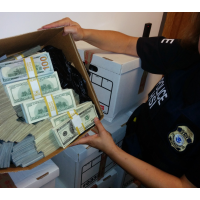Across U.S., Police Asset Seizures Fuel ”Slush Fund” for Buying Weapons, Luxury Cars, Travel…and Even a Clown
 (AP photo)
(AP photo)
A law that allows police departments to confiscate goods and money from people not charged with a crime has netted hundreds of millions of dollars that agencies have spent on things having nothing to do with law enforcement.
The Washington Post investigation previously revealed that law enforcement had taken away more than a billion dollars in property and cash from individuals under a federal forfeiture program that was originally set up to help cripple drug lords.
It turns out that police have spent large sums of the forfeited money to purchase weapons, armored cars and even entertainment. The list of purchases includes Humvees, a helicopter, automatic weapons, gas grenades, night-vision scopes, sniper gear, a coffee pot and the booking of at least one clown.
A former Department of Justice official who ran the asset forfeiture programs said it has become “a free floating slush fund” for police agencies. “All of this is fundamentally at odds with the U.S. Constitution,” Brad Cates, who was in charge of the program from 1985 to 1989, told the Post. “All of this is at odds with the rights that Americans have.”
Forfeited funds were used by Reminderville, Ohio, Police Chief Jeff Buck to pay $225 for a clown, Sparkles, to work at a community event. “The money I spent on Sparkles the Clown is a very, very minute portion of the forfeited money that I spend in fighting the war on drugs,” Buck said. The largest expense listed for that department using seized assets, $5,900, is for bus storage.
Members of the Randall County Sheriff’s Department in Amarillo, Texas, evidently like good coffee because that agency spent $637 of forfeited funds on a coffeemaker. They also spent $2,485 on “Smoking Pigs cooking team expenses,” according to the Post.
The newspaper’s Robert O'Harrow Jr. and Steven Rich found more than 80% of the nearly $2.5 billion spent by police involved in the program “came from cash and property seizures in which no indictment was filed.”
Getting the cash back from law enforcement can be difficult and time consuming, the investigation showed, because “owners must prove that their money or property was acquired legally in order to get it back.”
-Noel Brinkerhoff, Steve Straehley
To Learn More:
Asset Seizures Fuel Police Spending (by Robert O’Harrow Jr. and Steven Rich, Washington Post)
Government Self-Interest Corrupted a Crime-Fighting Tool into an Evil (by John Yoder and Brad Cates, Washington Post)
Local Governments Increase Revenue by Seizing Property Belonging to those not Charged with Crimes (by Noel Brinkerhoff and Steve Straehley, AllGov)
Seizing Citizens’ Property as a Revenue Source for Law Enforcement (by Noel Brinkerhoff and Danny Biederman, AllGov)
- Top Stories
- Unusual News
- Where is the Money Going?
- Controversies
- U.S. and the World
- Appointments and Resignations
- Latest News
- Trump Renames National Football League National Trump League
- Trump to Stop Deportations If…
- Trump Denounces World Series
- What If China Invaded the United States?
- Donald Trump Has a Mental Health Problem and It Has a Name






Comments